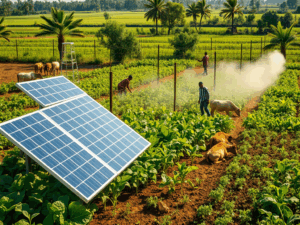
In the ever-evolving landscape of global agriculture, staying informed about market trends is crucial for agripreneurs looking to thrive. The agricultural markets are influenced by numerous factors, from technological advancements and climate change to shifting consumer preferences and international trade policies. For agripreneurs in Nigeria and the rest of Africa, understanding these trends can unlock new opportunities and drive growth. Here’s a look at the most significant trends in global agricultural markets that are shaping the future of agribusiness.
1. Technological Innovation and Precision Agriculture
Trend: The integration of technology in agriculture is revolutionizing the industry. Precision agriculture, which involves using data and technology to optimize farming practices, is gaining traction globally.
Impact:
- Efficiency and Productivity: Technologies such as drones, IoT sensors, and GPS-guided equipment enable farmers to monitor crops and livestock with unprecedented accuracy, leading to better resource management and higher yields.
- Sustainability: Precision agriculture promotes sustainable farming practices by reducing waste and minimizing the use of inputs like water, fertilizers, and pesticides.
Opportunity for African Agripreneurs:
- Adopt Affordable Technologies: Embrace affordable precision farming tools and techniques to boost productivity and sustainability.
- Train and Educate: Invest in training programs to educate farmers about the benefits and applications of new technologies.
2. Climate Change and Sustainable Practices
Trend: Climate change is having a profound impact on agriculture, prompting a shift towards more sustainable practices.
Impact:
- Resilient Crops: There is a growing demand for crops that can withstand extreme weather conditions.
- Sustainable Practices: Practices such as agroforestry, conservation agriculture, and organic farming are becoming more popular as they enhance soil health and biodiversity.
Opportunity for African Agripreneurs:
- Diversify Crops: Focus on cultivating climate-resilient crops and adopting sustainable farming practices.
- Access to Green Financing: Explore financing options and incentives for sustainable agriculture from governments and international organizations.
3. Changing Consumer Preferences
Trend: Consumers globally are becoming more health-conscious and environmentally aware, leading to a shift in demand towards organic, non-GMO, and sustainably produced foods.
Impact:
- Market Growth: There is an increasing market for organic and health-focused food products.
- Transparency and Traceability: Consumers are demanding more transparency about the origins and production methods of their food.
Opportunity for African Agripreneurs:
- Organic Certification: Obtain organic and sustainability certifications to tap into premium markets.
- Storytelling: Leverage the unique stories of your products’ origins and production methods to attract conscious consumers.
4. Digital Marketplaces and E-commerce
Trend: The rise of digital marketplaces and e-commerce platforms is transforming how agricultural products are bought and sold.
Impact:
- Wider Reach: Farmers can now reach a broader audience beyond local markets.
- Direct-to-Consumer: E-commerce enables farmers to sell directly to consumers, reducing reliance on middlemen and increasing profit margins.
Opportunity for African Agripreneurs:
- Online Presence: Develop a strong online presence through social media, websites, and e-commerce platforms.
- Digital Literacy: Improve digital literacy among farmers to effectively utilize online tools for marketing and sales.
5. Global Trade Policies and Market Access
Trend: International trade policies and agreements significantly influence global agricultural markets.
Impact:
- Market Opportunities: Trade agreements can open up new markets for agricultural products.
- Challenges: Tariffs, trade barriers, and geopolitical tensions can disrupt market access and trade flows.
Opportunity for African Agripreneurs:
- Stay Informed: Keep abreast of global trade policies and their implications for agricultural exports and imports.
- Explore Export Markets: Identify and pursue export opportunities in regions with favorable trade agreements.
Conclusion
The global agricultural markets are in a state of continuous evolution, driven by technological advancements, climate change, shifting consumer preferences, digital transformation, and international trade dynamics. For agripreneurs in Nigeria and the rest of Africa, understanding these trends is not just beneficial but essential for staying competitive and capitalizing on emerging opportunities.
By embracing technological innovations, adopting sustainable practices, catering to health-conscious consumers, leveraging digital platforms, and staying informed about global trade policies, African agripreneurs can position themselves for success in the dynamic global market.
This comprehensive analysis provides invaluable insights into the latest trends in global agricultural markets. By implementing the strategies and opportunities highlighted in this article, agripreneurs can drive growth and sustainability in their businesses. Share this article with your network and empower others to navigate the future of agribusiness with confidence!



